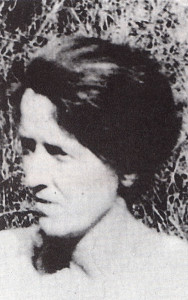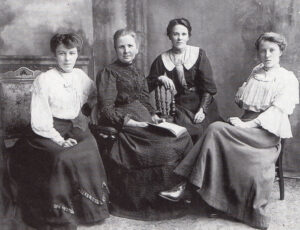
When I was young I was afraid of my grandmother. She was a strong, unsentimental woman who never showed affection to me, my two younger sisters or my mother, and because she never showed us any love, we felt none for her. It’s only now that I’m a grandmother myself that I can truly appreciate what she did for us.
My mother had been widowed before my youngest sister was born. It was 1937, and all she was left with for herself and three children under six years old was the basic widow’s pension of 10/- per week, plus an extra 6/- child allowance, so Gran came to live with us.
She took over our family and dominated us all, including Mum, controlling every aspect of our lives. She held the purse-strings, and without her widow’s pension from the First World War we wouldn’t have survived as a family.
As it was we were still very poor. Gran fed us on bread and Oxo for lunch and on a variety of potato dishes for dinner, and I can still hear her telling us sternly: “Get that down you or go without! ”
When war came in 1939 and the bombing of Plymouth began in late 1940, it was Gran who set about stiffening our collective backbones. “Just remember you’re British,” she would remind us sternly at the slightest hint of a tremble or tear. She was never one for a comforting hug.
Many years later, when Gran was very old, she came to live with me and my husband and our children. She hadn’t mellowed with age, and I often thought how hard and unapproachable she was.
Then one day, as she and I were sitting at the kitchen table with a cup of tea, she said suddenly:
“This is how I heard about your Grandad – sitting at the kitchen table drinking tea. I’d got home from work late and was dog-tired” (she worked as a
supervisor in a skin-yard and tannery, on her feet all day in appalling conditions).
“I picked up two letters from behind the door. Neither of them looked particularly interesting, so I put them on the kitchen table, made a cup of tea and got a biscuit before sitting down to read them. The first was a bill. The second was a letter from the War Office to say that my husband was ‘missing, presumed dead’.”
I asked hesitatingly, because she had never encouraged questions: “Was it early in the war, Gran?”

Untypically, she was in a communicative mood. “No, it was after we were bombed out in 1916.” I knew that she and Mum, who was then ten years old, had gone to live with relatives when Grandad went away to fight, and that they had been bombed out during a Zeppelin raid on Nottingham.
“We only had cuts and scratches, but the house was badly damaged. The others didn’t want me to write and. worry your Grandad, but I insisted and got him home on compassionate leave.” Her voice was fierce. “And I was always glad I did, because that was his last leave. He never came home again.”
With a deep-drawn breath she picked up her cup, and I knew her confidences were over.
Right to the end of her life, Gran was difficult to live with, quarrelsome and quick to take offence.
Now I’m a grandmother myself. Our grandchildren come to stay with us every summer and we have a wonderful time with them. It’s lovely to have them -and lovely to send them back home to their parents when the holiday is over!
Poor Gran! What a hard time she had bringing up three little children through poverty and war (my mother went to work in Devonport Dockyard in 1941). Gran held our family together. She was hard and unbending, but a woman of great courage. Betty Kellar








